Boolean Search In Recruitment: 11 Operators To Know
Sourcing great candidates is half the battle of recruiting. In order to hire the best person for the job, you need to identify, interview and pique the interest of the right people. It’s no easy feat, either — recruiters spend 13 hours on average sourcing candidates for a single role.
Using Boolean search in recruitment can to save time and improve the quality of your candidate pool, ultimately increasing the quality of your next hire. In this article, we’ll cover 11 essential Boolean search operators and five tips to success.
Free Playbook: How to Recruit in Turbulent Times
You will have access to 50+ pages of data, tips, and advice.
Table of Contents
What is Boolean Search in Recruitment?

Boolean search is a query methodology that is used to broaden, narrow or refine search results. It was invented by George Boole, an English mathematician and author of The Mathematical Analysis of Logic (1847) and it has significantly influenced the evolution of the search-engine giant, Google.
In recruitment, Boolean search helps to quickly and effectively locate ideal candidates for open roles. Similar to an “Advanced Search” function, Boolean search operators — words and symbols — allow you to include, exclude and tag specific keywords to carefully refine your search results. Ultimately, the goal of using Boolean search in recruitment is to hone in on broad topics — such as job titles or requirements — to identify a desirable, niche candidate pool.
Ultimately, the goal of using Boolean search in recruitment is to hone in on broad topics — such as job titles or requirements — to identify a desirable, niche candidate pool.
Using Boolean search operators to create a complex search string, recruiters can locate a range of relevant candidates. In doing so, you minimize sourcing needs and improve the efficiency of your recruitment process.
Advantages of Boolean Search in Recruitment

We understand that as a tech recruiter in a highly competitive industry, your bandwidth is already at or quickly approaching capacity. So before you dedicate the time to learning new sourcing techniques, let’s review some of the advantages of Boolean search in recruitment.
- Faster. It’s estimated that recruiters can identify 20-60 well-suited candidates for a given role per hour.
- Cost-effective. Job boards are great for networking, but they don’t always cater to a specific field or industry and can cost a pretty penny. This means recruiters have to individually sift through unqualified or irrelevant resumes to find the right candidates. Boolean search makes it easier to hone in on a specific set of candidates without having to pay a monthly subscription fee.
- More control. With a conceivably unlimited number of Boolean search string possibilities, recruiters can carefully customize how they source candidates and control the results.
- Active recruiting method. While you can’t necessarily get away from posting job openings, it is somewhat of a passive recruitment tactic. You’re assuming that the right candidate will come to you, which is ideal, but less attainable for young companies just getting started. Boolean search allows recruiters to actively source candidates without draining their resources.
6 Basic Boolean Search Operators Recruiters Should Know
To start creating complex Boolean search strings to improve your sourcing tactics, there are six essential operators you need to know. These can be used as many times as necessary in a search string and should be written in all-caps. Otherwise, they will be interpreted as part of your search string keywords, not as a Boolean search operator.
Operator #1: AND
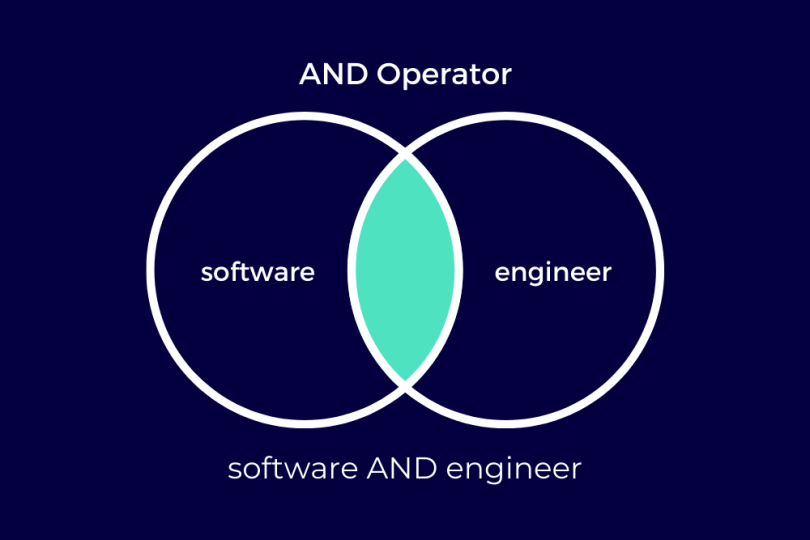
Functionality: Includes multiple criteria in search results
When to Use It: Use the AND operator to narrow search results based on multiple requirements.
Explanation: If you’re looking to hire a new software engineer, you’d use the AND operator to search for software AND engineer. The results you receive will include both “software” and “engineer.”
Boolean Search Example

Operator #2: OR
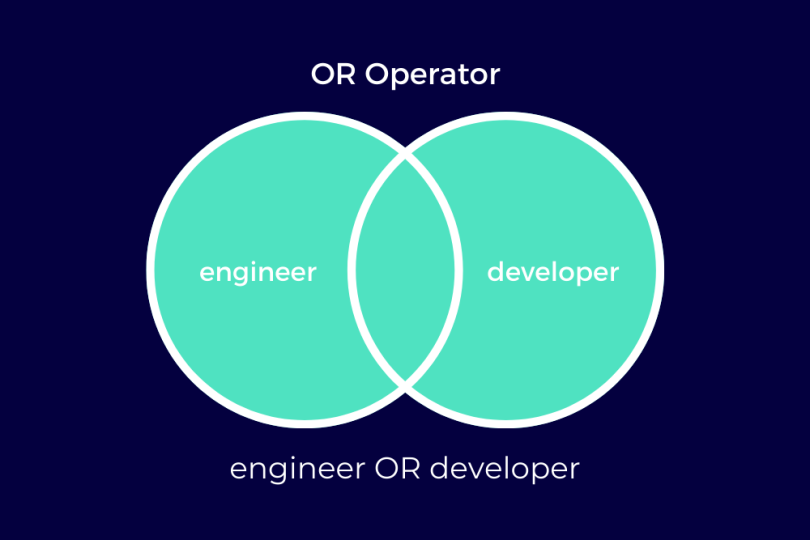
Functionality: Includes one or more criteria in search results
When to Use It: Use the OR operator to expand your search results.
Explanation: Your developer role is still vacant. You’re familiar with the software engineer vs. developer debate, so you broaden your search results by using the OR operator to search for engineer OR developer. This will generate a results list that includes either “engineer” or “developer.”
Boolean Search Example
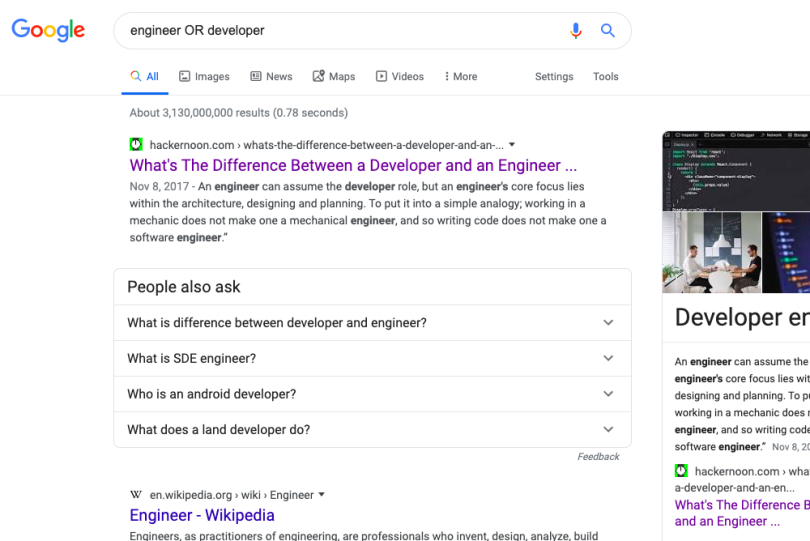
Operator #3: NOT or (–)
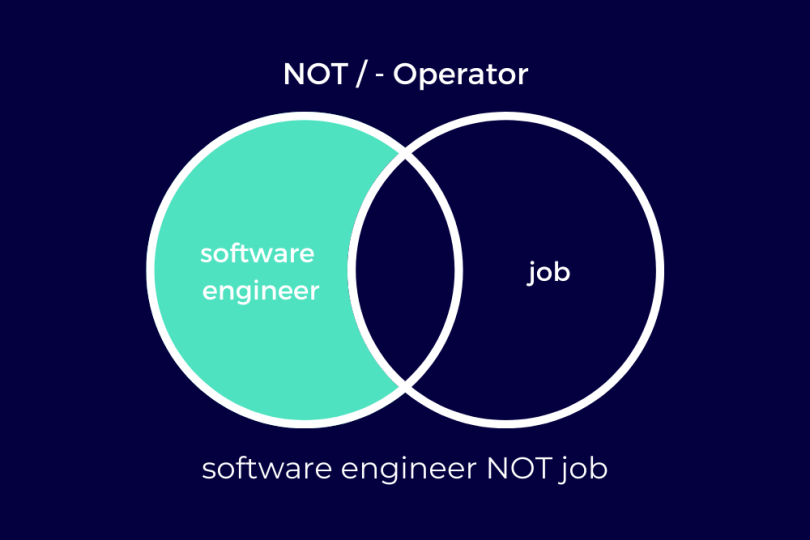
Functionality: Excludes unwanted criteria from search results
When to Use It: Use the NOT or (–) operator to narrow your search results by omitting unwanted criteria.
Explanation: Perhaps one of the most common and practical uses of Boolean search in recruitment is including the NOT operator to eliminate job postings; you’re looking for candidates to fill open roles, not a job seeker looking for a new position. To eliminate job postings and descriptions from your search results, include one or more of the following operators in your search string:
- NOT job; -job
- NOT jobs; -jobs
- NOT hire; -hire
- NOT hiring; -hiring
Use the (–) operator when searching on Google or LinkedIn, removing a space between the minus symbol and the keyword.
Boolean Search Example
- software engineer NOT job
- software engineer -job

When searching in Google using this Boolean search string, you may notice a jobs widget. Scroll past the widget to find the results that match your Boolean search criteria.
Operator #4: Brackets ()
Functionality: Group search phrases and prioritize operators
When to Use It: Use the brackets operator to include multiple operators without changing the search query.
Explanation: Brackets maintain groupings and indicate priority. Let’s say we’re looking for either a software engineer or developer. Since engineers specialize in various disciplines — chemical, mechanical, biomechanical, etc. — and developers are often associated with construction, it’s important we include software in our search string.
Without the brackets operator, the search string would look like this: software AND engineer OR developer NOT jobs. In this example, the search engine does not know which search to prioritize. Including brackets around engineer OR developer signals to the search engine to perform the engineer OR developer query first, then eliminate all results that do not include “software,” and all results relating to job, jobs, hire or hiring.
Boolean Search Example
- software AND (engineer OR developer) -job -jobs -hire -hiring

Operator #5: Quotations “”
Functionality: Search for exact phrase
When to Use It: Use the quotations operator when you want results that include an exact phrase.
Explanation: This is probably the search operator you’re most familiar with. We often use it when we’ve lost track of the source for a quote we like or when we need to find the name of a song we only remember a line or two of.
However, when performing a Boolean search in recruitment, only use the quotations operator when you are confident in the exact phrase you’re looking for. Otherwise, you’ll unintentionally exclude a large pool of viable results.
Boolean Search Example
Your team has decided that they are looking for a software engineer, not developer. To refine your search results, update your search query to the following:
- “software engineer” -job -jobs -hire -hiring


Operator #6: Asterisk *
Functionality: Search for variations of a root word
When to Use It: Use the asterisk operator to broaden your search results when you know there are multiple variations of a root word.
Example: To vastly expand your search results for a manager, searching for manag* will pull results like: manager, managed, managing, manages, management, managerial, etc.
Pay careful attention to where you truncate the root word as including an extra letter will modify your results. For example, searching for manage* will eliminate managing from the original list.
Boolean Search Example
- software AND (engineer OR developer) -job -jobs -hire -hiring AND manag*
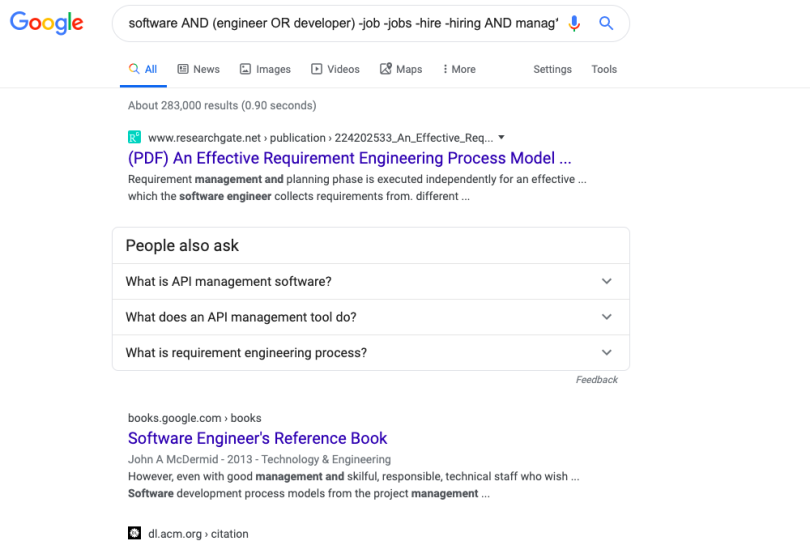
Sample String: Boolean Search in Recruitment
Now, let’s put these six operators to use and work backward to decode this search string.
- software AND (engineer OR developer) -job -jobs -hire -hiring AND manag* AND (“Ruby on Rails” OR Ruby)
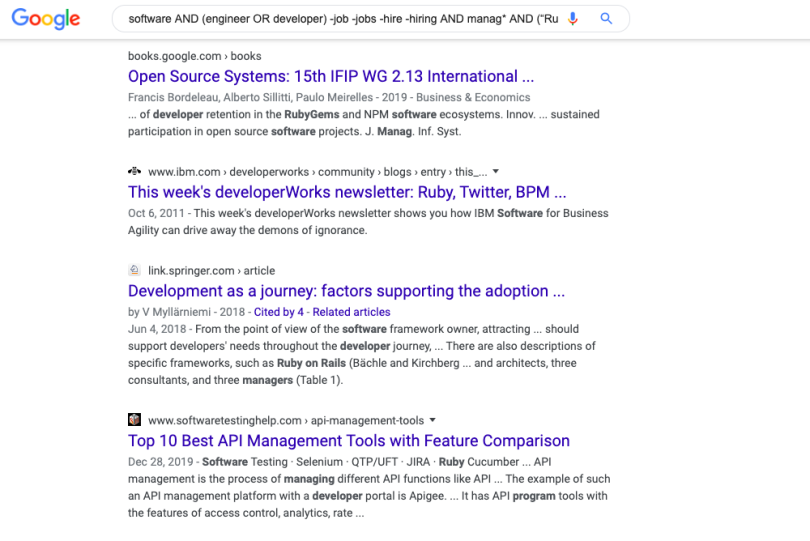
Our first two operators — software AND (engineer OR developer) — describe the role we’re looking for: a software engineer or software developer. We want individuals who meet this main requirement and who:
- Have management experience, but do not necessarily have “manager” in their title: AND manag*
- Have experience working with Ruby languages: (“Ruby on Rails” OR Ruby)
We also want to eliminate all job postings for similar roles: -job -jobs -hire -hiring
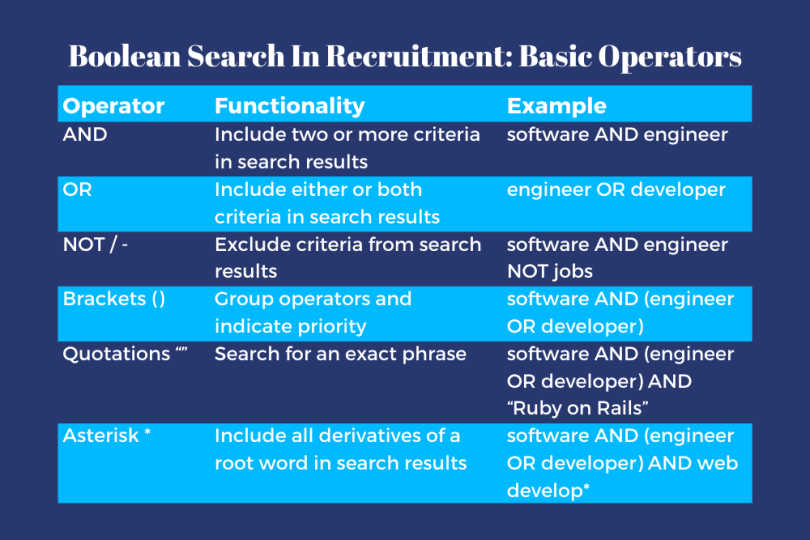
5 Advanced Boolean Search Operators

Once you feel confident in your ability to perform recruitment searches using the six basic Boolean operators, expand your skills using the following five advanced search functions. Note that unless the operator is shown in all-caps, it does not need to be capitalized in your search string.
Advanced Operator #1: Tilde ~
Functionality: Search for synonyms of a word
When to Use It: Use the tilde (~) operator to expand your search results when including criteria that may be described in multiple ways.
Explanation: When sourcing candidates, you’re interested in resumes, not job descriptions. However, you don’t necessarily want to exclude candidates who have a CV or curriculum vitae. Add the tilde operator to your search string to include all three application documents within your search results.
Boolean Search Example
- software AND (engineer OR developer) AND ~resume -job -jobs -hire -hiring AND manag* AND (“Ruby on Rails” OR Ruby)

Just by adding the tilde (~) operator, we already see more applicable, candidate-driven results.
Advanced Operator #2: NEAR
Functionality: Search for two words that appear within 1-10 words of each other in results
When to Use It: Use the NEAR operator to include a broader topic in your search results without unfavorably limiting them to an exact phrase.
Explanation: If you want your software engineer candidates to have experience in web development, use the NEAR operator to include results that discuss web development and are not limited to “web development” exactly.
As we discussed earlier, “develop” has many variations. To include results such as “web developer” or “developed multiple web pages,” use the asterisk operator on develop*. Include brackets to ensure the NEAR operator is interpreted properly.
Boolean Search Example
- software AND (engineer OR developer) AND ~resume -job -jobs -hire -hiring AND manag* AND (“Ruby on Rails” OR Ruby) AND (web NEAR develop*)

Advanced Operator #3: filetype:
Functionality: Search for results in specific file formats
When to Use It: Use the filetype: operator when searching your ATS or the web for resume or CV documents.
Explanation: Include a filetype: operator in your search string to limit results to only those with a specified file attachment that contains the other operator criteria. Since resumes can be linked online in various formats, we’ll also use the OR operator to avoid excluding other qualified resumes that may be in a different file type.
Boolean Search Example
- software AND (engineer OR developer) AND ~resume (filetype:pdf OR filetype:doc OR filetype:txt OR filetype:docx) -job -jobs -hire -hiring AND manag* AND (“Ruby on Rails” OR Ruby) AND (web NEAR develop*)

Advanced Operator #4: URL: and site:
Functionality: Search for results within a specific website
When to Use It: Use either the URL: or site: operator to narrow your search results to websites that are home to your target candidates, such as social media platforms or networking sites. Do not include a space between the operator and domain, as in: site:google.com.
Explanation: Since you’re looking for a software engineer, you can narrow your search results to only resumes from known developer websites, such as GitHub.com.
When sourcing across the entire internet, you’re sure to find candidates who meet your stated criteria. However, when searching a specific website, you will likely need to pare down your search string to just the basics to start. Then, add operators back on one at a time in order of priority to whittle down your list of results.
Boolean Search Example
- site:github.com software AND (engineer OR developer) AND ~resume -job -jobs -hire -hiring

Advanced Operator #5: intitle: / intext: / inurl:
Functionality: Search for results with keywords within the title (intitle:) or body text (intext:) of a web page, or within the URL (inurl:).
When to Use It: As an alternative to the filetype: operator, use the intitle: or intext: operators to search for resume pages or links within a website, or use the inurl: operator to find a relevant URL.
Explanation: Often, job seekers create online portfolios with links to all their work and application documents. While there is usually the opportunity to download a file, resumes and CVs are often uploaded as a web page with “resume” or “CV” in the title.
Using the intext: operator performs the same function as intitle:, but within the body text of a web page, just as the inurl: operator searches within the URL.
Boolean Search Example
- site:github.com (inurl:resume OR inurl:CV) software AND (engineer OR developer) -job -jobs -hire -hiring
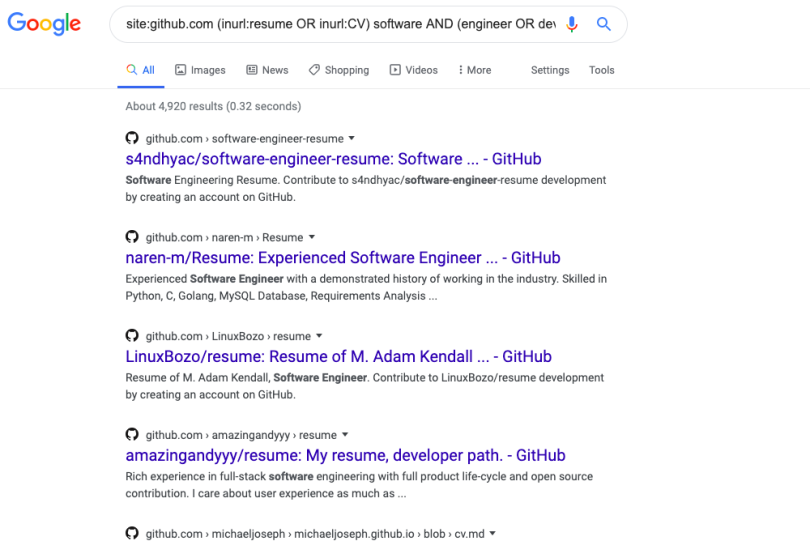
As you can see from the photo above, our most refined search string has yielded only resume results that meet our specified criteria. Now, we can evaluate each resume with confidence, knowing that these candidates will be relevant to our search.
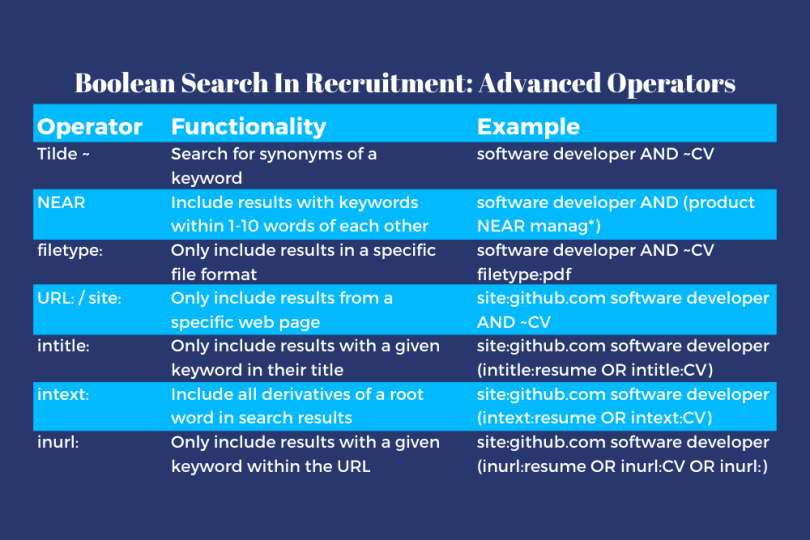
5 Tips for Using Boolean Search in Recruitment

Creating and testing new search strings is key to hone your skills and make the most of Boolean search techniques in recruitment. As you familiarize yourself with the operators we’ve discussed, use the following five tips to improve your results.
1. Use candidate personas
Creating a custom candidate persona for every open role gives you the information you need to recruit the right people. Work with hiring managers to distinguish job must-haves from nice-to-haves. Doing so will help you refine your Boolean search strings and accurately narrow your results.
2. Regularly modify your search string
Know that the more operators you add to your search string, the narrower your results become. While complex search strings will quickly help you identify your ideal candidate, you may unintentionally eliminate qualified individuals from your talent pool. Cut or add operators as needed to adjust your search results.
3. Record successful search strings
As you continue to use Boolean search methods, make note of search strings you use most frequently and that yield high-quality results. Keep these strings on hand to save time on future searches.
4. Keep a list of spelling variations
The more results you review, the more readily you’ll recognize spelling variations in your keywords. For example, candidates may write “Power Point” instead of “PowerPoint.” Keep track of spelling variations you notice and use the OR operator to include all known variations within your results.
5. Be aware of false positives
False positives — results that look accurate but aren’t — are common in Boolean search. No matter how specific and complex your search string is, an irrelevant result may find its way into the mix. Carefully consult each result and verify it meets your requirements.
Using Boolean search in recruitment is a low-cost, highly effective approach to sourcing candidates. The more experience you have crafting Boolean search strings the better your results will be. Minimizing your time spent sourcing candidates can drastically cut down on your cost-per-hire and reduce the cost-of-vacancy for open positions, so it’s worth your time to master Boolean search methods.
Free E-Book: Core Values in the Workplace
How to create core values that will inspire your workforce.




:max_bytes(150000):strip_icc()/GettyImages-559025517-2000-b3bece30a9074ec3958a4d39f69f2a79.jpg)


